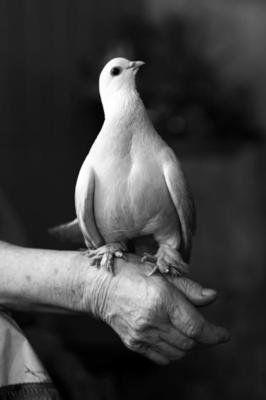
Keeping a single dove can be tempting due to space or practicality, but it’s essential to consider what a dove truly needs. Imagine being in a room full of people who you’ve never met—wouldn’t you feel a bit lonely? Doves feel the same way when they’re alone. Let’s dive deep into what makes these lovely birds tick and whether you can keep just one dove or if they’d prefer to have a buddy.
The Social Nature of Doves
Doves belong to the pigeon family, and they’re known for their gentle demeanor and affectionate behavior. Unlike some pets that can be independent like a cat or a fish, doves are more comparable to dogs when it comes to their social needs. These birds are naturally flock animals, meaning they thrive in groups. If you’ve ever seen a bunch of doves perched together, you might have noticed how they interact—cooing, preening, and even cuddling with one another.
Keeping *just one dove* can lead to loneliness. Doves express their emotions not only through sounds but also through body language. When alone, they may become stressed or exhibit signs of depression. If you’re serious about having a dove as a pet, it’s vital to understand that they don’t just need food and shelter; they need companionship, too.
The Benefits of Having Two Doves
Imagine the joy of watching two doves interact. Having two doves can significantly enhance their quality of life. They spend time grooming each other, which is a bonding behavior that reinforces their connection. Here are some reasons why having two doves is better:
- Social Interaction: Two doves will play and coo together, providing each other with a social outlet.
- Reduced Stress: A companion can alleviate anxiety and make them feel secure in their environment.
- Better Health: Happy doves tend to be healthier, both physically and mentally.
If you’re worried about the extra responsibility, consider that two doves can often entertain each other, reducing the need for constant attention from you. It’s like having a built-in buddy system!
Common Myths About Keeping Doves
There are a few myths that can mislead potential dove owners, and it’s essential to clarify them. One common belief is that doves are low-maintenance pets that can thrive in solitude. While they might not require walks like dogs, they absolutely need emotional support. Here are some myths debunked:
- Myth 1: Doves don’t need companionship.
- Myth 2: One dove will be perfectly happy alone.
- Myth 3: Doves can entertain themselves indefinitely.
Each myth underestimates the social nature of these birds. They require interaction, not just from their human caretakers but ideally from other doves.
How to Prepare for Dove Companionship
If you decide to welcome two doves into your home, preparation is key. Start by ensuring you have an appropriately-sized cage that allows for enough movement and interaction. Here are some steps to get ready:
1. Choose the Right Cage: Look for a spacious aviary that provides horizontal space for flying. Doves love to stretch their wings!
2. Safe Environment: Make sure the environment is dove-friendly—remove any toxic plants and secure windows to prevent escapes.
3. Two of Everything: Ensure you have two food and water dishes. Doves can be territorial and may prefer their own space during meal times.
When the doves arrive, give them time to adjust. Introducing them slowly can help them build their bond without stress.
Signs Your Dove is Lonely
It can be tough to read a dove’s emotions if you’re not familiar with their behavior. Here are some signs that your dove might be feeling lonely:
- Excessive Vocalization: If your dove is cooing more than usual or seems distressed, it might be reaching out for companionship.
- Plucking Feathers: This can indicate stress or loneliness, as doves sometimes self-soothe by plucking their feathers.
- Less Interactive: A typically curious dove that suddenly becomes withdrawn may be feeling isolated.
Recognizing these signs early means you can take action, whether that’s getting them a friend or spending more quality time with them.
What If You Decide to Keep Just One Dove?
If you find that keeping two doves isn’t feasible for you, it’s essential to take extra steps to ensure your single dove’s happiness. Here are some suggestions:
1. Increase Interaction: Spend more time with your dove, engaging in activities like gentle handling or talking to them.
2. Environmental Enrichment: Provide toys and mental stimulation. Simple things like hanging toys or mirrors can help keep your dove entertained.
3. Regular Socialization: If possible, allow your dove to interact with other birds during supervised playtime. This can help fulfill some of their social needs.
Knowing your dove’s personality is also crucial. Some may adapt better to being alone than others. But remember, they will always prefer companionship, so consider their needs seriously.
Doves are delicate, social creatures that thrive in companionship. While it might seem possible to keep just one dove, it’s essential to recognize their social needs and the potential emotional challenges of solitude. By understanding their behavior and providing for their needs—whether you choose to keep two or adapt your care for one—you can create a nurturing environment for your feathered friend.
In the end, it’s about providing the best life you can for your dove, ensuring they’re happy and healthy. If you truly want to welcome a dove into your home, think carefully about their social nature and how you can meet their needs, making them an integral part of your life.
